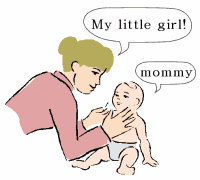|
性行為的發展 |
|
性行為的發展概述:
性腳本之說
|
|
性腳本之說的生物基礎 |


 |
必須強調兩個基本觀點:其一,所有的性行為具有生物基礎;其二,腳本(scripting)只能對先天的潛質進行塑造。
做一個簡單的比喻就可以闡述清楚:每一個兒童天生就有說話的潛力。可是,兒童說哪一種語言,這得依賴於社會環境。在英國,所依賴的是英語;在法國,依賴的是法語。不僅如此,甚至:發音清晰的孩子、充滿愛心、頻繁地與孩子說話的父母等各種因素,都會使孩子的語言技巧發展得比沒有這些條件的孩子要好。最終,一些具有語言特殊才能的孩子將從他們所聽見的受惠更多,而較少語言才能的孩子將受惠較少。簡而言之,說話的潛力可以以多種多樣的方式得以發展,但是,也可以被不鼓勵孩子做出努力來好好說話的社會環境所牽制和阻擾。
一個人的性潛力(sexual
potential)也符合同一原理。它同樣沿著社會環境所提示或暗示的線路得到發展。兒童從父母和年長的親屬那裏習得什麼是他們適當的性別角色,獲悉什麼行為被認為是“性行為”,什麼行為會被允許,什麼行為會被禁止。大一點的兒童和青少年從不斷擴大的成人圈、從他們的朋友那裏學習如何和什麼時候接近潛在的性夥伴,學習到與他們做什麼和接下來該做什麼。他們也學習如何協調相互滿意的性關係,學習如何“不攙和麻煩的事”。可是,他們的性潛力也可能會被否定的教育和負面的體驗所牽制和阻擾。簡而言之,隨著個體的成長,他們按照其生活的社會環境所提供的腳本,學習如何塑型他們的性行為。他們既以自己滿意的方式也以周圍人可接受的方式習得他們的性行為。絕大多數的孩子會在這方面取得成功,但並不是全部的孩子都會獲得成功。
China
(right-右:在中國)。 |
|
(從上左至下右)
在英國、法國、德國和中國。
Mother and child(from the top)
in England, France , Germany and
|
|
|
Development of Sexual Behavior |
|
Introduction: A Script?
|
|
Biological Basis
|
|
  
|
It must be emphasized that all sexual behavior has a biological basis, and that scripting can only shape an inborn potential.
A simple comparison will make this clear: Every child is born with the potential for speech. However, which language children will learn, depends on the social environment. In England, it will be English, in France, French. Not only that: Children of articulate, loving parents, who frequently talk to them, will develop better language skills than those that are neglected. Finally, some children have a special talent for language, and these will profit more from what they hear, while less talented children will profit less. In short, the potential for speech may develop in a great variety of ways, and it may also be hampered and frustrated by a social environment that does not reward a child’s efforts to speak well.
The same is true of a person’s sexual potential. It also develops along the lines suggested by the social environment.
Children learn from their parents and older relatives what their proper gender roles are, what behavior is considered “sexual”, what is permitted, and what is forbidden. Older children and adolescents learn from an ever-widening circle of adults and from their friends how and when to approach potential sexual partners, what to do with them and in what sequence. They also learn how to negotiate a mutually satisfying sexual relationship, and how to “stay out of trouble”. However, their sexual potential may also be frustrated and distorted by negative teachings and experiences.
In short, as they grow up, individuals learn how to shape their sexual behavior according to scripts provided by their social environment. They try to do this in ways that are both satisfying to them and acceptable to those around them. Most people will succeed in this, but not all.
|
|
Mother and child
(from the top)
in England, France, Germany
|